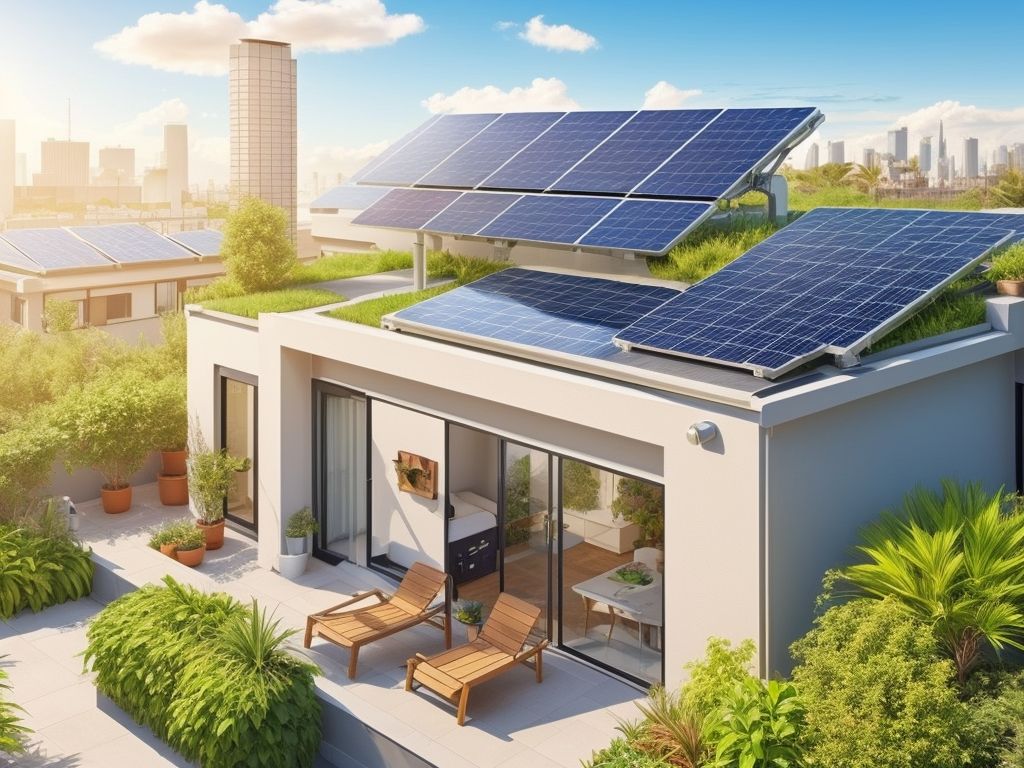Solar panels provide an innovative way to power homes. They convert sunlight into electricity, reducing reliance on traditional energy sources. Besides being green, they can also save money – lower energy bills, and possibly even generate surplus power for sale back to the grid.
Mount solar panels on rooftops or in sunny areas to absorb sunlight. Photons in sunlight are taken in by solar cells, creating electric current for powering a home. Amazingly, they still generate electricity on cloudy days. This makes them a reliable energy source in any weather.
Installing solar panels has many benefits. Rising energy costs mean savings on monthly bills. Plus, governments and utility companies often offer incentives and rebates. Some jurisdictions allow selling surplus power back to the grid.
Don’t miss out! Enhance your home with solar power. Join the community of eco-friendly homeowners and help pave a greener future. Install solar panels today!
What are solar panels?
Solar panels are composed of photovoltaic cells. These cells capture photons from the sun’s rays, releasing electrons and creating electricity! This eco-friendly form of energy can supplement or even replace traditional sources. Not only that, but it can also reduce energy bills. With minimal maintenance and a lifespan of 25-30 years, solar panels make for a great long-term investment.
Plus, they’re versatile! They can be used in a variety of settings, from residential homes to commercial installations. And, since they rely on daylight rather than direct sunlight, they work in any climate or location.
The idea of using solar energy is centuries old. Scientists first discovered the photoelectric effect in the 19th century, which serves as the basis for solar panels today. However, significant advancements weren’t made until the mid-20th century. This allowed for the mass production and availability of solar panels that we know today.
Benefits of installing solar panels in your home
Installing solar panels in your home can be beneficial in many ways. Consider these six advantages:
- Savings on costs: With the power of the sun, you can lower your electricity payments and even make money through net metering.
- Environmentally-friendly energy: Solar panels help decrease carbon emissions. This makes them an environmentally-friendly alternative to reducing climate change.
- Increased property value: Homes with solar panels are desirable, as they offer long-term financial advantages and an eco-friendly lifestyle.
- Energy self-reliance: Solar power enables you to depend less on the grid electricity, giving you more control over your energy consumption and costs.
- Durability: Quality solar panels are made to tolerate rough weather and can last decades with minimal maintenance or replacement costs.
- Government incentives: Governments offer tax breaks, refunds, and other incentives to urge homeowners to invest in renewable energy systems such as solar panels.
Moreover, by installing solar panels, you contribute to a greener future and meet your needs sustainably. Don’t miss out—think about having solar panels in your home now!
How do solar panels work?
Solar panels are key players in renewable energy production. They absorb sunlight and initiate a chemical reaction to generate direct current (DC). To make it usable, an inverter transforms the DC into alternating current (AC). Let’s understand the process better.
Sunlight hits the panel’s surface. Photons knock electrons loose in PV cells. Conductive plates trap the electron flow. This creates DC electricity. Inverters then change it to AC.
To maximize efficiency, place panels south with no shade. Cleaning them helps too. Monitor energy usage to figure out peak demands. That way you can use solar energy and reduce reliance on conventional sources.
Additionally, pair solar panels with battery storage systems. This way you can store excess energy for later.
By understanding how solar panels work and following these tips, you can benefit from this renewable tech and contribute to a greener future.
Steps to installing solar panels in your home
Installing solar panels is a smart way for you to help the environment and save money. Here’s how to get started:
- Planning: Figure out how many panels you need. Think about the roof’s orientation, shade, and local laws.
- Find an installer: Search for a licensed and experienced installer. Get quotes and compare warranties.
- Paperwork: Get permits from your local government and utility company. Look into incentives and financing.
- Installation: On the scheduled day, the installers will put the panels on your roof or in your yard. They’ll connect them to an inverter and your electrical panel.
Also, some utilities offer net metering programs. Plus, regular maintenance is important for optimal performance.
Pro Tip: Before solar panels, do an energy audit to find other ways to save energy at home.
Financial incentives and rebates for solar panel installation
Installing solar panels on your home can provide many financial advantages. These can help reduce the initial cost of installation and make solar power a more affordable option.
- The federal government offers a Solar Investment Tax Credit (ITC) that can let homeowners deduct a percentage from their federal taxes.
- States and local governments may provide grants, loans, property tax exemptions, or pay homeowners for the electricity generated.
- Net metering programs credit homeowners for excess energy.
- Solar renewable energy certificates (SRECs) can give an extra source of income.
Also, some utility companies have special financing options to help with the upfront cost. Plus, more people using solar panels reduces the cost of installation.
In 2000, Germany’s feed-in tariff program offered high payments. This caused a surge in the solar industry and made Germany a global leader.
By taking advantage of the incentives, households can save money and contribute to a better future. Solar panels are becoming an increasingly sensible option.
Maintenance and care for solar panels
To keep solar panels running at their best, regular cleaning is essential. Use a soft cloth or a brush with non-abrasive bristles to remove dust, debris, and leaves. Also, inspect for any damage such as cracks, loose wiring, or water leaks. Trim any trees and foliage that may be shading the panels. Monitor the performance of your panels through tools provided by the manufacturer or installer.
Solar panels are very durable and require minimal maintenance. But regular cleaning can optimize energy generation and preserve panel efficiency. It’s worth noting that SEIA suggests regular maintenance can extend the lifespan of solar panels by up to 25 years!
Frequently asked questions about solar panels for homes
Solar panels for homes are a great way to save cash and lower your carbon footprint. Here’s a few commonly asked Qs and As about solar panels:
-
- How do they work?
Solar panels convert sunlight into electricity with photovoltaic (PV) cells. These cells, usually made from silicon, capture the photons in sunlight, creating an electric current.
-
- Can they power my whole house?
It depends on the size of your system and the amount of sunlight. Sometimes, solar panels can produce enough electricity to run an entire home.
-
- What if it’s cloudy or rainy?
Solar panels still generate energy during cloudy or rainy days, but with less efficiency than sunny days. The extra energy produced on sunny days can be saved in batteries for cloudy days.
-
- Are there any maintenance requirements?
Solar panels usually don’t need much upkeep. However, it’s recommended to regularly clean them to remove dirt and debris. Also, check-ups by professionals can help find any issues or damage.
Plus, did you know that some states have incentives such as tax credits or rebates for solar panels? That means cheaper installation and more savings for homeowners.
Tom and Sarah decided to go solar after learning the benefits. Not only did they have a clean energy source for their home, but they also saw a noticeable decrease in their utility bills. They were pleased with their choice, and they encouraged others to go solar, too.
Conclusion
Solar panels on your home are great! They use the sun to make electricity. Plus, they help the environment and cut bills. It’s a smart choice for people who want renewable energy and a greener future.
Sunlight is converted into electricity. So, you don’t need fossil fuels or the grid as much. You become more independent and there’s less strain on the environment.
Solar panels lower your energy bills. You even make money through net metering programs. These programs let you sell your extra electricity back to the grid.
The Smiths in Arizona are a great example. They were worried about bills and wanted to do something good. After they installed solar panels, their energy bills dropped right away. Plus, they got back their investment in just a few years.
Frequently Asked Questions
Q: What do solar panels do for your home?
A: Solar panels generate electricity by converting sunlight into energy. They can help power your home, reduce your electricity bills, and contribute to a cleaner environment.
Q: How do solar panels work?
A: Solar panels contain photovoltaic cells that absorb sunlight and convert it into direct current (DC) electricity. An inverter then converts this DC electricity into alternating current (AC) electricity, which can be used to power your home’s electrical appliances.
Q: Can solar panels power my entire home?
A: The number of solar panels required to power your entire home depends on factors such as your energy consumption, the size of your roof, and the amount of sunlight your location receives. It is possible to install a system that meets all or most of your electricity needs, but in some cases, solar power may supplement rather than fully replace your grid electricity.
Q: Are solar panels expensive?
A: While there is an initial cost involved in purchasing and installing solar panels, they can save you money in the long run. The cost of solar panels has significantly decreased in recent years, and various incentives and financing options are available to make them more affordable. Additionally, solar panels can increase the value of your home.
Q: What are the environmental benefits of solar panels?
A: Solar panels produce clean energy without emitting greenhouse gases, thus reducing your carbon footprint. By using solar power, you can help combat climate change and air pollution, and conserve natural resources for future generations.
Q: Is maintenance required for solar panels?
A: Solar panels generally require minimal maintenance. Regular cleaning to remove dust and debris, as well as occasional inspection for any damage or shading issues, is recommended. However, most solar panels come with warranties that cover maintenance and repairs for a certain period of time.
Related posts:
- How Much Does Solar Increase Home Value? | Zillow Insights
- How Much Do Home Solar Panels Cost? A Complete Guide to Solar Panel Prices
- Determining the Perfect Size: How Much kW Solar Panel is Required for Your Home
- How Many Solar Panels to Power Home? A Comprehensive Guide on Calculating Solar Panel Requirements



